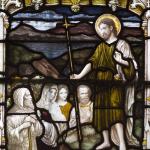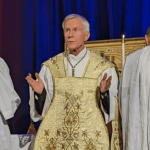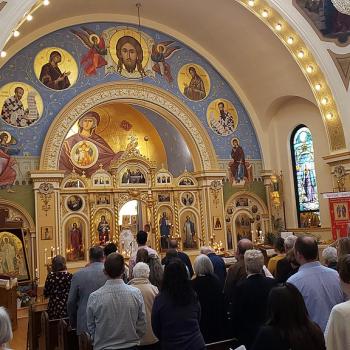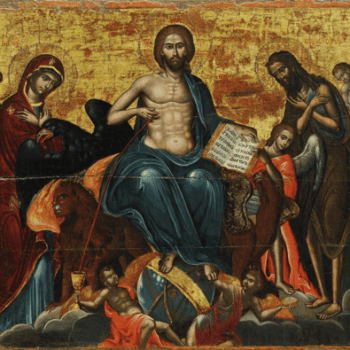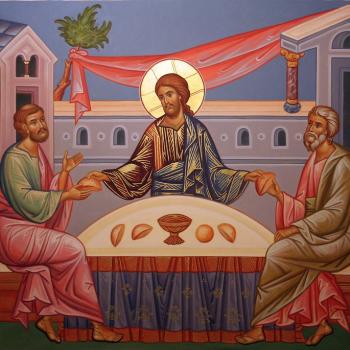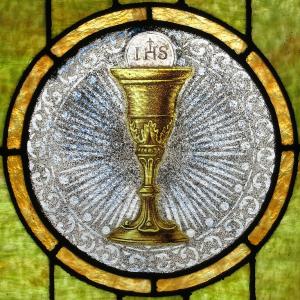
Jesus offers himself in the eucharist as an act of love, giving us a chance to partake of him, and by doing so, find ourselves united with him and his life. We are not meant to treat the eucharist as some sort of magical talisman which helps us achieve our petty desires, nor as something which reinforces our selfish, egotistical mode of engagement with the world, but rather, as a gift of love which helps us to become what we eat. That is, when we receive communion, we are to join in and share with the rest of creation the self-giving love we receive in the eucharist.
Due to Jesus’ presence in the eucharist, a presence which is sacramental, not physical, it is understandable we can and will revere him in it, but that was not why Jesus instituted the eucharist. He was clear at the Last Supper: we are to take, eat and drink, and by doing so, find ourselves receiving him and all that he is (God, man, creator, creature) into ourselves. While we can explore the eucharist in a variety of ways, from the symbols being presented to us by the way Jesus employed bread and wine as the vessels for communion, to what it means to talk about the real presence, we must not do so if it would have us ignore its primary purpose. Those who would do so most likely have misunderstood the mystery of the eucharist itself, and in doing so, as Fr. George Maloney warned us, end up objectifying what is not meant to be objectified (because the eucharist is Jesus, a divine person giving himself to us in an act of love, and not some object for us to control and manipulate):
If we fail to understand the mystery of the Eucharist as the fullness, not only of God’s self-emptying love for us, but as the fullness of the building up and completion of the entire plan of God’s salvation, then we truly do not understand the Eucharist and the communion of saints. We can easily “objectivize” the Eucharist as a form of presence in a “place” where Jesus became present to individuals who receive Him in a space and a time where Jesus is present in “this” host or inside that tabernacle “over there.” And we will miss the full mystery of the Eucharist and the Body of Christ.[1]
The eucharist is food, and we are meant to eat it. Just as we might store food for times of need, so some of the eucharist can be and will be reserved, and as it is revered, it can be and will be venerated. But, again, the reason why we reserve it is to be able to supply spiritual food to those who need it outside of the liturgy (such as those who are sick and shut in). It is the bread of life, Jesus himself, and by receiving Jesus, we enter into communion with him and all those he is in communion with: “It is also called communion because it makes us have communion with all the saints, so that what is lacking in one may be supplied from the common bounty of all the saints.” [2] When we try to place the eucharist apart from everyone else, and turn it into a thing only to be worshiped, or a thing meant for only a limited few people, we abandon the original purpose of the eucharist and by doing so, risk losing all that Christ intends us to have through it. The eucharist is given to us so that we can be built up by Christ, who will, through it, help us build connections with everyone else who is in the body of Christ.
We are called to be one body, that is, one “living organism” so to speak, which is not other than the body of Christ in history (that is, the church). As this organism has a place in history, it will have a beginning, and it will find its consummation at the end of the world. Until then, it will live and thrive as all organisms, do, which is, to change, dealing with the needs of the times. During every age of its existence, we will see it changing; if we did not, then the organism could no longer be said to be alive:
Still more because ‘my church’ was not intended by Our Lord to be static or remain in perpetual childhood; but to be a living organism (likened to a plant), which develops and changes in externals by the interaction of its bequeathed divine life and history – the particular circumstances of the world into which it is set. There is no resemblance between the ‘mustard-seed’ and the full-grown tree. For those living in the days of its branching growth the Tree is the thing, for the history of a living thing is pan of its life, and the history of a divine thing is sacred. The wise may know that it began with a seed, but it is vain to try and dig it up, for it no longer exists, and the virtue and powers that it had now reside in the Tree.[3]
The eucharist, with Christ giving himself to us, is what brings us together; it gives us life so that through it, the church which it establishes can continue to thrive in history, changing in some aspects to meet the tides of time while remaining one and the same. It does so, not just because it brings us the personal presence of the God-man in history, nor because we find ourselves one with him, but also in and through him, we find ourselves partaking of the eternal life of God:
The first and greatest effect of the Eucharist is to bring us into a oneness of the trinitarian community of love. Through the intensification of our union with the risen Jesus, the Holy Spirit brings us into a new awareness of our being, also, one with the Father and the Holy Spirit. [4]
This awareness should change us. When we experience and participate in divine love, we should find it working in and through us so that we become personal reflections of that love. Our lives will become more and more like Christ, revealing the self-emptying love of God to others. If we circumvent that change, if we try to counter what is being offered in the eucharist, participation in the divine life itself, and turn it into something which separates the divine life from the world by trying to transform the eucharist into the objectified presence of Christ which we keep to ourselves and use for our own selfish gain, we end up denying the full reality of the eucharist itself. This is why it is important for us to get the eucharist right, to reflect upon it in a way beyond the objectified manner which many treat it, so that we and everyone else can receive the eucharist in the right spirit, in the spirit of love. If not, we risk receiving the eucharist in an unworthy manner, in a manner which is contrary to love, and in doing so, risk all the consequences that follow when divine love meets our unlove and our attempt to justify our unlove through a misappropriation of the eucharist itself. That is, we will meet the consuming fire of God’s love which consumes all that us unlove, and experience the loss which it brings.
[1] George A. Maloney, SJ, Communion of Saints (Hauppauge, NY: Living Flame Press, 1988), 123.
[2] St. Albert the Great, On the Body of the Lord. Trans. Sr. Albert Marie Surmanski, OP (Washington, DC: CUA Press, 2017), 269.
[3] J.R.R. Tolkien, The Letters of J.R.R. Tolkien. Revised and Expanded Edition. Ed. Humphrey Carpenter and Christopher Tolkien (Broadway, NY: William Morrow, 2023), 553 [Letter 306 to Michael Tolkien].
[4] George A. Maloney, SJ, Communion of Saints, 126
Stay in touch! Like A Little Bit of Nothing on Facebook.
If you liked what you read, please consider sharing it with your friends and family!
N.B.: While I read comments to moderate them, I rarely respond to them. If I don’t respond to your comment directly, don’t assume I am unthankful for it. I appreciate it. But I want readers to feel free to ask questions, and hopefully, dialogue with each other. I have shared what I wanted to say, though some responses will get a brief reply by me, or, if I find it interesting and something I can engage fully, as the foundation for another post. I have had many posts inspired or improved upon thanks to my readers.


